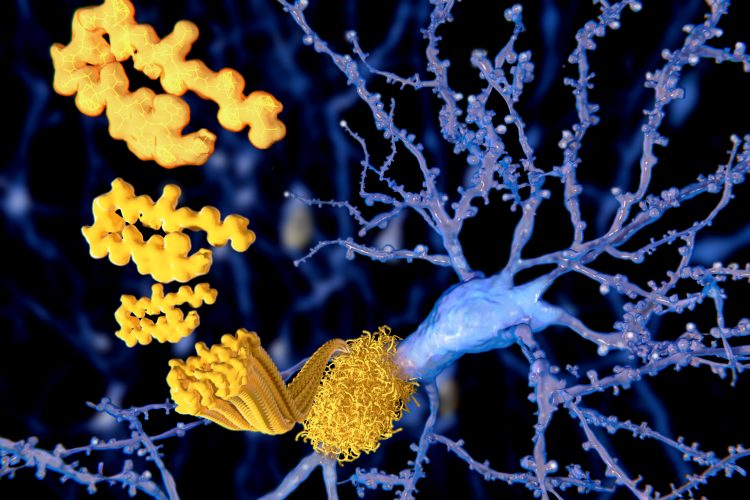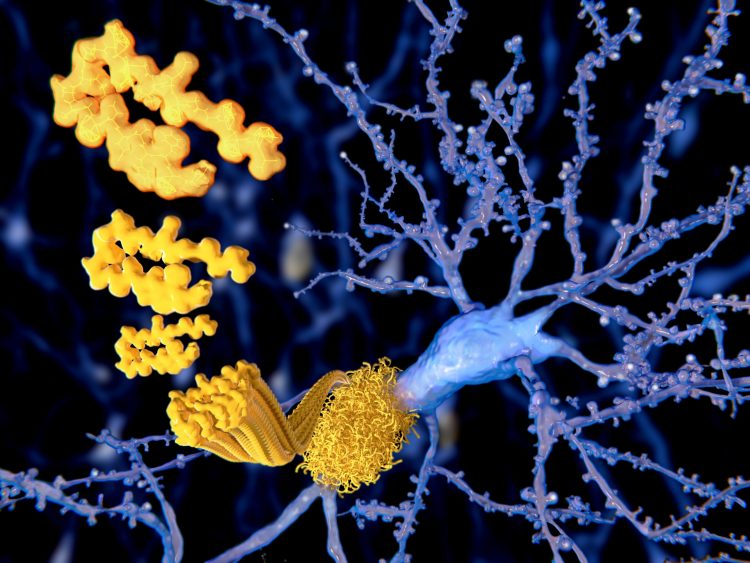Scientists create a nanobody that could treat Parkinson’s disease
Researchers have developed a nanobody that can penetrate the tough exterior of brain cells and untangle misshapen proteins that lead to Parkinson’s disease.
List view / Grid view
1 August 2022 | By Ria Kakkad (Drug Target Review)
Researchers have developed a nanobody that can penetrate the tough exterior of brain cells and untangle misshapen proteins that lead to Parkinson’s disease.
28 February 2022 | By Ria Kakkad (Drug Target Review)
A study has shown how Parkinson’s disease may be driven by cell stress-related biochemical events that disrupt a key cellular clean-up system.
11 October 2021 | By Anna Begley (Drug Target Review)
Stealth BioTherapeutic's SBT-272 improved mitochondrial motility in a murine model of amyotrophic lateral sclerosis.
26 March 2020 | By Hannah Balfour (Drug Target Review)
Scientists used optical photothermal spectroscopy (O-PTIR) to image murine neurons affected by early stage Alzheimer’s disease, providing insight into the progression of the disease.
© Russell Publishing Limited, 2010-2025. All rights reserved. Terms & Conditions | Privacy Policy | Cookie Policy
This website uses cookies to improve your experience while you navigate through the website. Out of these cookies, the cookies that are categorised as "Necessary" are stored on your browser as they are as essential for the working of basic functionalities of the website. For our other types of cookies "Advertising & Targeting", "Analytics" and "Performance", these help us analyse and understand how you use this website. These cookies will be stored in your browser only with your consent. You also have the option to opt-out of these different types of cookies. But opting out of some of these cookies may have an effect on your browsing experience. You can adjust the available sliders to 'Enabled' or 'Disabled', then click 'Save and Accept'. View our Cookie Policy page.
Necessary cookies enable the core functionality of the website, including security, network management and accessibility. These cookies do not store any personal information. You may disable these by changing your browser settings, but this may affect how the website functions.
| Cookie | Type | Duration | Description |
|---|---|---|---|
| cookielawinfo-checkbox-advertising-targeting | persistent | 1 year | The cookie is set by GDPR cookie consent to record the user consent for the cookies in the category "Advertising & Targeting". |
| cookielawinfo-checkbox-analytics | persistent | 1 year | This cookie is set by GDPR Cookie Consent WordPress Plugin. The cookie is used to remember the user consent for the cookies under the category "Analytics". |
| cookielawinfo-checkbox-necessary | persistent | 1 year | This cookie is set by GDPR Cookie Consent plugin. The cookie is used to store the user consent for the cookies in the category "Necessary". |
| cookielawinfo-checkbox-performance | persistent | 1 year | This cookie is set by GDPR Cookie Consent WordPress Plugin. The cookie is used to remember the user consent for the cookies under the category "Performance". |
| PHPSESSID | session | 1 year | This cookie is native to PHP applications. The cookie is used to store and identify a users' unique session ID for the purpose of managing user session on the website. The cookie is a session cookies and is deleted when all the browser windows are closed. |
| viewed_cookie_policy | persistent | 1 year | The cookie is set by the GDPR Cookie Consent plugin and is used to store whether or not user has consented to the use of cookies. It does not store any personal data. |
| zmember_logged | session | 1 year | This session cookie is served by our membership/subscription system and controls whether you are able to see content which is only available to logged in users. |
Advertising and targeting cookies help us provide our visitors with relevant ads and marketing campaigns.
| Cookie | Type | Duration | Description |
|---|---|---|---|
| advanced_ads_browser_width | persistent | 1 month | This cookie is set by Advanced Ads and measures the browser width. |
| advanced_ads_page_impressions | persistent | 2 years | This cookie is set by Advanced Ads and measures the number of previous page impressions. |
| advanced_ads_pro_server_info | persistent | 1 month | This cookie is set by Advanced Ads and sets geo-location, user role and user capabilities. It is used by cache busting in Advanced Ads Pro when the appropriate visitor conditions are used. |
| advanced_ads_pro_visitor_referrer | persistent | 1 year | This cookie is set by Advanced Ads and sets the referrer URL. |
| bscookie | persistent | 2 years | This cookie is a browser ID cookie set by LinkedIn share Buttons and ad tags. |
| IDE | persistent | 2 years | This cookie is set by Google DoubleClick and stores information about how the user uses the website and any other advertisement before visiting the website. This is used to present users with ads that are relevant to them according to the user profile. |
| li_sugr | persistent | 3 months | This cookie is set by LinkedIn and is used for tracking. |
| UserMatchHistory | persistent | 1 month | This cookie is set by Linkedin and is used to track visitors on multiple websites, in order to present relevant advertisement based on the visitor's preferences. |
| VISITOR_INFO1_LIVE | persistent | 5 months | This cookie is set by YouTube. Used to track the information of the embedded YouTube videos on a website. |
Analytics cookies collect information about your use of the content, and in combination with previously collected information, are used to measure, understand, and report on your usage of this website.
| Cookie | Type | Duration | Description |
|---|---|---|---|
| bcookie | persistent | 2 years | This cookie is set by LinkedIn. The purpose of the cookie is to enable LinkedIn functionalities on the page. |
| GPS | persistent | 30 minutes | This cookie is set by YouTube and registers a unique ID for tracking users based on their geographical location |
| lang | session | 1 year | This cookie is set by LinkedIn and is used to store the language preferences of a user to serve up content in that stored language the next time user visit the website. |
| lidc | persistent | 1 day | This cookie is set by LinkedIn and used for routing. |
| lissc | persistent | 11 months | This cookie is set by LinkedIn share Buttons and ad tags. |
| vuid | persistent | 2 years | We embed videos from our official Vimeo channel. When you press play, Vimeo will drop third party cookies to enable the video to play and to see how long a viewer has watched the video. This cookie does not track individuals. |
| wow.anonymousId | persistent | 2 years | This cookie is set by Spotler and tracks an anonymous visitor ID. |
| wow.schedule | persistent | 20 minutes | This cookie is set by Spotler and enables it to track the Load Balance Session Queue. |
| wow.session | persistent | 20 minutes | This cookie is set by Spotler to track the Internet Information Services (IIS) session state. |
| wow.utmvalues | persistent | 20 minutes | This cookie is set by Spotler and stores the UTM values for the session. UTM values are specific text strings that are appended to URLs that allow Communigator to track the URLs and the UTM values when they get clicked on. |
| _ga | persistent | 2 years | This cookie is set by Google Analytics and is used to calculate visitor, session, campaign data and keep track of site usage for the site's analytics report. It stores information anonymously and assign a randomly generated number to identify unique visitors. |
| _gat | persistent | 1 minute | This cookies is set by Google Universal Analytics to throttle the request rate to limit the collection of data on high traffic sites. |
| _gid | persistent | 1 day | This cookie is set by Google Analytics and is used to store information of how visitors use a website and helps in creating an analytics report of how the website is doing. The data collected including the number visitors, the source where they have come from, and the pages visited in an anonymous form. |
Performance cookies include cookies that deliver enhanced functionalities of the website, such as caching. These cookies do not store any personal information.
| Cookie | Type | Duration | Description |
|---|---|---|---|
| cf_ob_info | persistent | 1 minute | This cookie is set by Cloudflare content delivery network and, in conjunction with the cookie 'cf_use_ob', is used to determine whether it should continue serving “Always Online” until the cookie expires. |
| cf_use_ob | persistent | 1 minute | This cookie is set by Cloudflare content delivery network and is used to determine whether it should continue serving “Always Online” until the cookie expires. |
| free_subscription_only | session | 1 year | This session cookie is served by our membership/subscription system and controls which types of content you are able to access. |
| ls_smartpush | persistent | 1 month | This cookie is set by Litespeed Server and allows the server to store settings to help improve performance of the site. |
| one_signal_sdk_db | persistent | Until cleared | This cookie is set by OneSignal push notifications and is used for storing user preferences in connection with their notification permission status. |
| YSC | session | 1 year | This cookie is set by Youtube and is used to track the views of embedded videos. |









